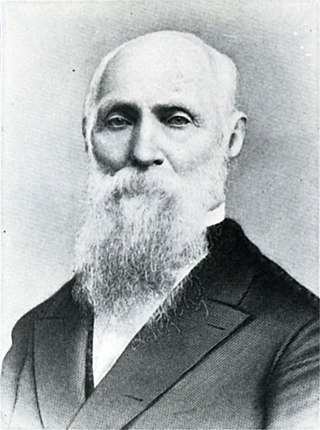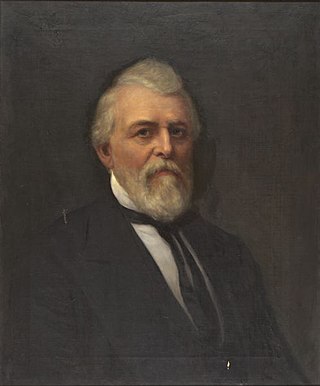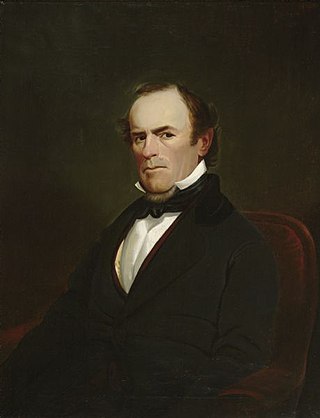Related Research Articles

The Territory of Iowa was an organized incorporated territory of the United States that existed from July 4, 1838, until December 28, 1846, when the southeastern portion of the territory was admitted to the Union as the state of Iowa. The remainder of the territory would have no organized territorial government until the Minnesota Territory was organized on March 3, 1849.

The Territory of Wisconsin was an organized and incorporated territory of the United States that existed from July 3, 1836, until May 29, 1848, when an eastern portion of the territory was admitted to the Union as the State of Wisconsin. Belmont was initially chosen as the capital of the territory. In 1837, the territorial legislature met in Burlington, just north of the Skunk River on the Mississippi, which became part of the Iowa Territory in 1838. In that year, 1838, the territorial capital of Wisconsin was moved to Madison.

George H. Walker was an American trader and politician, and was one of three key founders of the city of Milwaukee, Wisconsin. He served as the 5th and 7th Mayor of Milwaukee, and represented Milwaukee in the Wisconsin State Assembly and its predecessor body in the Wisconsin Territory.

First Capitol Historic Site is a free-admission historic museum located outside Belmont, Wisconsin, United States. The museum includes two of the buildings first used by legislators to meet in Wisconsin Territory. Currently owned and operated by the Wisconsin Historical Society, the site is listed on the National Register of Historic Places.
Isaac Leffler, sometimes spelled Lefler or Loeffler, was an American lawyer and Iowa pioneer who represented Virginia's 18th congressional district in the United States House of Representatives for one term in the 1820s. He also served in the legislatures of the Commonwealth of Virginia, as well as the Wisconsin and Iowa Territories. His younger brother, Shepherd Leffler, became one of Iowa's first congressmen after achieving statehood.

William Williams Chapman was an American politician and lawyer in Oregon and Iowa. He was born and raised in Virginia. He served as a United States Attorney in Iowa when it was part of the Michigan and Wisconsin territories, and then represented the Iowa Territory in the United States House of Representatives. He later immigrated to the Oregon Country, where he served in the Oregon Territorial Legislature.

Moses McCure Strong was an American lawyer, politician, businessman, and Wisconsin pioneer. He was one of the framers of the Constitution of Wisconsin, a member of the territorial legislature, and United States Attorney for the Wisconsin Territory under President Martin Van Buren. After Wisconsin achieved statehood, he was speaker of the Wisconsin State Assembly during the 3rd Wisconsin Legislature (1850).
George B. Reed was an American lawyer, railroad executive, Democratic politician, and Wisconsin pioneer. He served six years in the Wisconsin State Senate, representing Manitowoc County, and also served as county judge and the first village president of Manitowoc, Wisconsin. He was known as the "father of the Wisconsin Central Railroad" which connected Lake Superior to Milwaukee. He was also the co-founder and namesake of Reedsville, Wisconsin, in Manitowoc County.

Levi Sterling was an American farmer, politician, and Wisconsin pioneer. He was one of the first American settlers at what is now Iowa County, Wisconsin. He served five years in the Wisconsin Legislature and—before Wisconsin achieved statehood—he served three years in the Wisconsin Territorial Assembly. During the American Civil War, he served as a Union Army cavalry officer.
Peter Hill Engle was an American lawyer, judge, and Iowa pioneer. He served as the first Speaker of the Legislative Assembly of the Wisconsin Territory after it was established, when it still contained the territory of the future states of Iowa and Minnesota. He later served as a judge of the St. Louis County, Missouri, Court of Common Pleas from 1841 until his death.

The 1848 Wisconsin gubernatorial election was held on May 8, 1848. This was the election for the first Governor of Wisconsin, which became a U.S. state that year, as it was held concurrent with a public referendum to ratify the Constitution of Wisconsin.
The Seventh Michigan Territorial Council, also known as the Rump Council, was a meeting of the legislative body governing Michigan Territory in January 1836, during the term of Acting Governor John S. Horner. At the time, most of Michigan Territory was awaiting admission to the union as the state of Michigan and had already seated its new state legislature. This was the final session of the Council and consisted only of members from the "contingent remainder" or "rump territory"—the remaining counties that formed the new Wisconsin Territory later that year.
The First Legislative Assembly of the Wisconsin Territory convened from October 25, 1836, to December 9, 1836, and from November 6, 1837, to January 20, 1838, in regular session. The Assembly also convened in special session from June 11, 1838, to June 25, 1838.
Jeremiah Smith Jr. was an early settler in what is now Burlington, Iowa but was then in the Iowa District of the Michigan Territory. He worked as a merchant and land speculator, and later became a farmer and grower of fruit trees. He served as a representative for Des Moines County in the Council of the 1st Wisconsin Territorial Assembly, since at that time Iowa was part of Wisconsin Territory, from October 25, 1836, to June 25, 1838.
The Territory of Iowa Legislative Assembly or Legislative Assembly of Iowa Territory was the legislature of Iowa Territory, which operated between the creation of the territory in 1838 and statehood in 1846.
John Parker was a local American politician in Dubuque County in the Iowa District of what was first the Michigan Territory, then the Wisconsin Territory, and eventually the Iowa Territory. He was elected to the last legislature of the old Michigan Territory to represent his district; but did not attend.
Allen Hill was an American physician from Dubuque County in the Iowa District of what was first the Michigan Territory, then the Wisconsin Territory, and eventually the Iowa Territory. He was elected to the last legislature of the old Michigan Territory to represent his district; but did not attend.
Aspen Grove Cemetery is a cemetery in Burlington, Iowa. In 2022, it was listed as a historic district on the National Register of Historic Places.
References
- ↑ A Memorial and Biographical Record of Iowa Vol. 1. Chicago: The Lewis Publishing Company, 1896; pp. 357-58]
- ↑ Parvin, Theodore S. "The Early Bar of Iowa" in, Historical Lectures Upon Early Leaders in the Professions in the Territory of Iowa. Delivered at Iowa City 1894 Iowa City: State Historical Society, 1894; p. 82
- ↑ Petersen, William J. "The Legal Profession", The Palimpsest October 1938 (Vol. 19, Issue 10); pp. 433-434
- ↑ The History of Henry County, Iowa: Containing a History of the County, Its Cities, Towns, &c., a Biographical Directory of Citizens, War Record of Its Volunteers in the Late Rebellion, General and Local Statistics ... History of the Northwest, History of Iowa ... Western historical Company. 1879.
- ↑ Salter, William. Iowa, the First Free State in the Louisiana Purchase: From Its Discovery to the Admission of the State Into the Union, 1673-1846 Chicago: A.C. McClurg, 1905; pp. 191-94
- ↑ Strong, Moses M. History of the Territory of Wisconsin from 1836 to 1848 Madison: Democrat Printing Co., 1885; pp. 193-195
- ↑ Parvin, Theodore S. "The Early Bar of Iowa" in, Historical Lectures Upon Early Leaders in the Professions in the Territory of Iowa. Delivered at Iowa City 1894 Iowa City: State Historical Society, 1894; p. 72
- ↑ From the Iowa Capitol Reporter "Iowa Legislature", Iowa State Gazette and Advertiser December 17, 1842; p. 2, col. 7 via Newspapers.com
- ↑ "The Iowa Legislature > Legislators > Legislator > Councilor Joseph Bartlett Teas" The Iowa Legislature website; accessed November 18, 2021
- ↑ A Memorial and Biographical Record of Iowa Vol. 1. Chicago: The Lewis Publishing Company, 1896; p. 358]